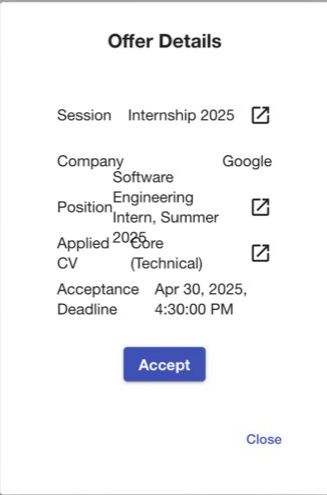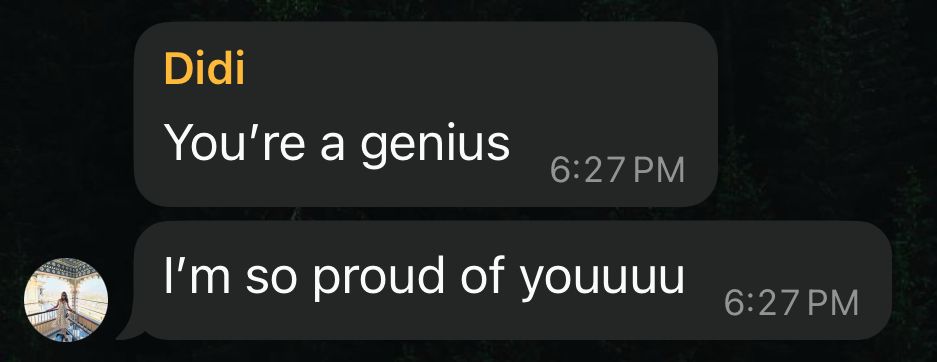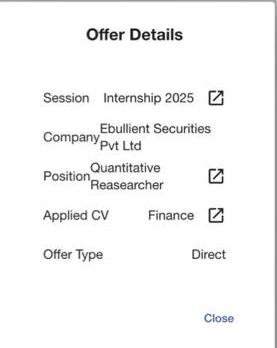Trust the Process!
Welcome to my first ever blog!
This blog is gonna be something special and very close to my heart, it’s about internships!
I will divide this into two parts: firstly, my personal experience, and second, some suggestions and tips for juniors.
Context
For those who are not familiar with the internship process in our college (which is similar in many colleges): a variety of companies visit our campus, be it tech, consult, finance, etc. Each company has its own recruitment procedures, but I will focus mostly on tech/finance-based companies. These firms typically have 2-3 stages of screening: resume shortlisting, online coding assessments (OA), and interviews. Some companies may also conduct a Group Discussion (GD) round, but this is uncommon for tech-based firms.
For coding, one has to be familiar with basic-to-advanced Data Structures & Algorithms (DSA). The OA generally consists of 3-4 problems to be solved in around an hour (varies from company to company). Many students practice from platforms like Leetcode (LC) and CodeForces (CF).
A side note: Finance-based firms, especially High-Frequency Trading (HFT) firms, are a different breed altogether. These companies develop trading strategies and trade in financial markets using advanced math and programming, often executing trades in microseconds. They are referred to as “Quant firms” and are among the highest-paying companies globally. Broadly, these firms have two roles: Quant Researcher (QR) and Quant Developer (QD). QR roles focus on mathematical modeling and strategy design, while QD roles focus on developing high-performance trading infrastructure. To crack a QR role, one needs a strong grasp of probability and mathematics.
Being passionate about mathematics since childhood, I was naturally drawn to the QR role (not to mention the high pay, jk). I targeted top international HFT firms like Optiver and Da Vinci, especially because of their Amsterdam-based offices (a little travel dream, xD).
Preparation Phase
In the summer of ‘24, I wasn’t doing any internship or project and had just started preparing for the OA rounds. I rigorously practiced coding, solving problems for hours each day on CF & LC, often managing only 3-4 problems daily. This intense routine reminded me of my JEE preparation days—endless hours on the same chair and desk, isolated from my family, solely focused on coding.
Initially, my momentum was strong, but I soon hit a plateau, particularly struggling with advanced concepts like Graphs and DP. Around this time, I came across a free “3-day Graph Camp” conducted by a CF “Master” (referred to as MKV Sir) via IITD notices. Attending the camp turned out to be a game-changer—it made complex topics feel effortless. Impressed, I enrolled in the full 2-month paid course that covered all relevant DSA topics for OA rounds.
Simultaneously, I prepared for QR roles by solving quant puzzles and studying probability intensively. Despite my efforts, my CF rating stagnated, which was frustrating. A long discussion with MKV Sir made me realize that rating wasn’t my ultimate goal—cracking OA rounds was. I still remember his lines:
“Rating pe dhyaan mat do Akshat” [Don’t focus on rating]
This shift in mindset helped me focus better, as my end goal was to crack OA’s. Around this time, I partnered with a friend to practice quant puzzles and coding problems daily.
For the QR roles, I specifically trained for the “80 in 8” test format used by Optiver specifically: 80 arithmetic questions in 8 minutes! This intense preparation continued from May until early July.
The Process & Shortlists
As mid-July approached, so did my anxiety. OA rounds started around the 16th, with most tests happening after the 23rd (when the semester began). To avoid distractions, I decided to travel back to campus early, on the 13th.
My initial OAs, including those for Google and Microsoft, went decently. The first QR tests (Ebullient, Millennium, etc.) also went well. However, the period leading up to Day 1 was relentless—back-to-back tests, sometimes three in a single day. The toughest day was when both my dream companies, Optiver and Da Vinci, had their OAs scheduled back-to-back. Exhausted, I underperformed and failed to qualify for either. The rejection was disheartening, but a friend’s advice to focus on other companies helped me move forward.
Over the next few days, I faced more disappointments. Despite performing exceptionally well in Citadel Securities and another top Indian quant firm’s tests, I wasn’t shortlisted. By early August, just days before Day 1, I had zero shortlists and was feeling defeated. But as they say, “Sabar ka fal meetha hota hai”—patience pays off. Within a few days, I received over 10 shortlists, including Google, which was a huge morale booster.
I particularly remember NK’s test, it had one graph question, that none of my friends could solve, but I was able to do, all thanks to MKV Sir!
So, finally, for Day 1, I had six shortlists, along with their interview times (Relevant for next part):
- Goldman Sachs (8 AM)
- Google (11 AM)
- Eightfold.AI (Afternoon)
- Ebullient Securities (Afternoon)
- NK Securities (Afternoon)
- American Express (Afternoon)
The Big Day
On August 3rd, the big day arrived. I wore formals for the first time, feeling both nervous and confident. After waiting for around 1.5 hours, I had my first ever interview (Goldman Sachs):
I walked in confidently, smiled awkwardly, and sat down. The interview started off easy, but then came a simple coding question that I couldn’t solve, even after many hints. I felt nervous and started panicking. After 5-10 minutes, the interviewer gave me the answer and moved on to a brainteaser, which I solved quickly.
Next was a follow-up I hadn’t seen before. I was so nervous that I just stared blankly, unsure whether to ask for hints. The interviewer noticed and helped me, after which I gave a partial solution—but I could tell she wasn’t satisfied. She then moved on to my resume, asking about my projects.
That’s when I realized I had messed up. Everyone before me had 30-minute interviews, and mine barely lasted 15-20 minutes. The interview ended, and I walked out, disappointed, knowing I wouldn’t make it to the next round. I waited outside for 20-25 minutes, and as expected, they didn’t call my name :(
I didn’t lose hope—I still had five more interviews to go. Around 10:30 AM, I headed for my next one, which was online and had 2-3 rounds depending on performance. I logged in, and the interview began. The room had others giving their interviews too, but I stayed focused, explained my solution, and felt it went well. The interviewer said I’d get a mail if I was selected for the next round.
After 5-10 minutes, I got the mail—finally, some good news! Round 2 was another tech round with a basic question. I coded the solution, explained it, and the interviewer seemed satisfied. Again, I was told to wait for further updates.
Later, the POC informed us there wouldn’t be a third round—selected candidates would directly get an offer on their portal. I stepped out to grab something with friends, some of whom had already received offers. I was happy for them but also anxious about my own results, as I hadn’t heard back yet.
I had four interviews in the second half, including two quant roles I was really aiming for. The first one (Eightfold.AI) started around 3 PM. The interviewer was quite young, having graduated just two years ago. He asked me some coding questions, which I answered, and we discussed my projects. It went well, and he said I’d be notified if I qualified for the second round—something I was getting used to hearing by now. I stepped out, checked my portal, only to find that…

Yay! I got an offer from Google! Though late, I was super happy. I called my sister and parents, who were proud and excited. My friends were waiting for me at the hostel, but fate had other plans—I got a call from the Ebullient POC for an interview. Since I had really been aiming for a quant role, I thought, why not give it a shot? If I got in, it would be even better, as I had prioritized quants over Google.
With an offer in hand, I walked into the interview confidently. The interviewer, an IITD alum, started with a probability question, which I solved quickly, impressing him. Next, he gave me a standard problem but asked for a non-conventional approach. I recalled a method I had studied—boom! It was correct, and he called it very creative.
After a coding question, he casually asked, “Tujhe regression aata hai?” [Do you know regression?]. The conversation turned friendly, but when I gave a basic definition, he challenged me, making me realize my mistake. However, I nailed the follow-up on regression assumptions, which made him laugh. “Definition nahi pata, but assumptions bahut ache se aata hai,” he joked.
He was happy with my performance and sent me straight to the founder’s round, skipping the usual 2-3 rounds. It was a short HR-style discussion, and the founders seemed pleased. Now, I just had to wait for the results.
During my technical round, I kept getting calls from Eightfold for Round 2. The senior interviewer told me to answer, but I explained that I had an offer and wouldn’t be coming. He joked, “Lagta hai tujhe kaafi offers aa rakhe hai” [Seems like you have many offers]. I laughed and said I just really wanted this role.
After the founder’s round, I got a call from NK Securities—the other quant firm I was eyeing. I decided to give it a shot. The virtual round was filled with probability puzzles and C++ questions, which I answered well. The interviewer was happy and gave me the usual “we’ll get back to you” line—I was tired of hearing it by now.
Stepping outside, I got another call—this time from Ebullient’s HR Head, offering me the role! I was overwhelmed with joy, almost in tears. I quickly told my sister and parents, and their happiness doubled! This was my sister’s response:

I told NK Securities’ POC that I wouldn’t go for Round 2, as I was exhausted and content. I then rushed to shake hands with Ebullient’s HR Head, who congratulated me. I declined further interview calls, including Amex and another HFT (which had rejected me earlier, but this time, I rejected them).
The only issue—Google was still on my portal. I called a friend in OCS, who advised me to mail and visit the office. Rushing there, I explained my passion for quant to the professors, convincing them to override the offer.
Finally, I returned to my hostel, where my friends, who had seen me upset just two days ago, were overjoyed. While celebrating, I kept checking my portal, but the offer hadn’t reflected yet. Worried, I visited the office with a friend, and the team reassured me before updating it. And there it was!

It was official! I had rejected Google to chase my dream of a QR internship. One of the happiest moments of my life—just days ago, I was doubting my prep. I headed back to the hostel, treated my friends to a pizza party, and celebrated the moment!
Takeaways & Tips for Juniors
- Focus on learning, not just ratings. CF/LC ratings don’t determine success—your problem-solving ability does.
- Be strategic with your preparation. Identify weak areas early and work on them (e.g., my Graph Camp experience).
- Don’t get disheartened by rejections. You only need one offer that aligns with your goals.
- Practice company-specific test formats. If applying for QR roles, practice speed math rigorously.
- Have a support system. Discuss problems with friends, seek mentorship, and stay positive.
Okay, enough of motivation, I really wanted to share this beautiful experience of mine, which I will truly remember for a long time, if not, I will visit this blog :) I know, it might be too long, but hopefully, you would have found out some motivation from it too, and would TRUST THE PROCESS.
Hope you enjoyed the blog :)
Footnote: This was my first ever blog, so I am not very professional, so kindly ignore grammatical errors or the writing style. Also, I have decided to post a blog every month (don’t know how regular I will be able to). It would mostly be math blogs, some personal blogs like this one, and some cool stuff which I encounter.
